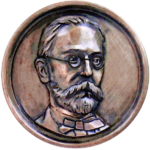Current issue
Online first
Special issues
Archive
About the Journal
Editorial Board
Editorial Council
Reviewers
Editorial guidelines
Publication ethics
Guidelines for reviewing
Remarks on “ghostwriting”
Copyrights and Open Access rule
GDPR Privacy Notice – for the authors of articles sent for publication in the "Komunikaty Mazursko-Warmińskie ("Masuro-Warmian Bulletin")
Contact
Price list
Reformation in Prussia and Polish reformation in Masuria
1
Uniwersytet Mikołaja Kopernika w Toruniu
Online publication date: 2021-06-16
Publication date: 2021-06-16
KMW 2021;311(1):3-18
KEYWORDS
Duchy of PrussiaPrince AlbrechtLutheran bishops (PolentzQueis)Polish language in Lutheran Churchreformation prints
TOPICS
ABSTRACT
This article consists of four parts. In the first part that is entitled the “Word of Lord in the mother tongue of the Masurians”, the author stresses the importance of a sermon delivered by Jerzy
Polentz – the bishop of Samland and the first Lutheran bishop in history – in the royal cathedral
on 24 December 1523, in which he admonished that the Word of God should be preached in
the native tongue of the believers, in the case of Masurians – the Polish language. The second
part, entitled “Official introduction to Lutheranism in the Duchy of Prussia”, discusses the documents issued by Prince Albrecht, in which he established the principles of faith and conduct
in the Lutheran Church of the Ducal Prussia. These included: 1. “Reformation Mandate” of
6 July 1525, demanding that priests preach “pure” Word of God, which according to the contemporary terminology meant preaching the Gospel based on the teaching of Martin Luther; 2.
“Church Ordinance” and “Agenda or articles about ceremonies”, both documents published on
10 December 1525; 3. “Visitation instruction” of 13 March 1526, containing regulations regarding the transformation of Catholic parishes into Lutheran ones. The third part is entitled “Polish
pastors in Masuria” and lists the names of first Lutheran priests active in the southern part of
East Prussia. They were usually former Catholic priests who converted into Lutheranism. Many
of them were Polish. Finally the fourth part entitled Polish Lutheran books in Masuria” is devoted to Polish religious prints (Catechism, New Gospel, Posil, Augsburg Confession, etc.). The
author quotes here Władysław Chojnacki who claimed that more Polish prints were published
in the 16th century in the Ducal Prussia (Königsberg and Lyck) than in entire Poland: 104
prints appeared in Polish, 183 in German and 90 in Latin. Most of them contained Lutheran
religious writing. Usually, one parish owned at least a copy of the Bible, Postil, Catechism and
a Polish Hymnal. One copy of Catechism allowed the community of believers to learn the Ten
Commandments, while one copy of Hymnal enabled them to memorise many sacred songs.
REFERENCES (32)
1.
Arnoldt David H., Kurzgefasste Nachrichten von allen der Reformation an den Lutherischen Kirche in Ostpreussen gestandenen Predigern, Königsberg 1777
3.
Brehm Johannes, Entwicklung der evangelischen Volksschule in Masuren, Bialla 1914.
4.
Chojnacki Władysław, Bibliografia polskich druków ewangelickich ziem zachodnich i północnych 1530–1939, Warszawa 1966.
5.
Chojnacki Władysław, Osadnictwo polskie na Mazurach w XIII–XVII w., w: Szkice z dziejów Pomorza, t. 2,Warszawa 1959.
6.
Chojnacki Władysław, Stosunki kulturalne na Mazurach w XVI–XVII wieku, w: Szkice z dziejów Pomorza, Warszawa 1959.
7.
Drukarze dawnej Polski od XV do XVIII wieku, t. 4, Pomorze, opr. A. Kawecka-Gryczowa oraz K. Korotajowa, Wrocław 1962.
8.
Dusterhaus G., Das ländliche Schulwesen im Herzogtum Preussen im 16. und 17. Jahrhundert, Bonn 1975.
10.
Die Geschichte und kulturelle Entwicklung Masurens, w: Masuren, hrsg. von H.Gollub, Konigsberg 1934.
11.
Gundermann Iselin, Die Anfäge der ländlichen evangelischen Pfarrbibliotheken im Herzogtum Preussen, Blätter für
deutsche Landesgeschichte, Jg. 110, 1974.
13.
Kętrzyński Wojciech, O ludności polskiej w Prusiech niegdyś krzyżackich, Lwów 1882.
14.
Koch Franz, Die ältesten Visitationsberichte über Masurische Kirchen- und Schulverhältnisse aus den Jahren 1529 u.
1531, Ostdeutsche Monatshefte für Erziehung und Unterricht, Bd. 2, 1904.
15.
Koch Franz, Masurische Kirchen und Schulverhältnisse in den Jahren 1579 und 1581, Ostdeutsche Monatshefte für Erziehung und Unterricht, Bd. 2, 1904.
16.
Koch Franz, Kirchen- und Schulverhältnisse im Herzogtum Preussen in den Jahren 1568, 69, 70, Ostdeutsche Monatshefte.
17.
Koch Franz, Kirchen- und Schulverhältnisse im Herzogtum Preussen in den Jahren 1568, 69, 70, Ostdeutsche Monatshefte für Erziehung und Unterricht, Bd. 1, 1903.
18.
Krysiak Dominik, Ewangelicy w Mikołajkach. Dzieje parafii Ewangelicko-Augsburskiej w latach 1945–2007, Dąbrówno 2010.
19.
Kuhn W., Geschichte der deutschen Ostsiedlung in der Neuzeit, Bd. 1–2, Köln 1955, 1957.
20.
Małłek Janusz, Michał Meurer reformator Mazur, „Komunikaty Mazursko-Warmińskie”, 1962, nr 3(77).
21.
Małłek Janusz, Migracje ludności niemieckiej, polskiej i litewskiej na ziemie pruskie w XIII–XVI wieku, „Komunikaty Mazursko-Warmińskie”, 2003, nr 4.
22.
Małłek Janusz, Początki protestantyzmu w Prusach Książęcych (sekularyzacja państwa zakonu krzyżackiego w Prusach a problem ponownej ewangelizacji), w: Laicyzacja i sekularyzacja społeczeństwa nowożytnego (XVI–
XVIII w.), red. J. Wiśniewski Olsztyn 2008.
23.
Małłek Janusz, Reformacja w Prusach Książęcych, w: Warmia i Mazury. Zarys dziejów, Olsztyn 1985.
24.
Małłek Janusz, Zróżnicowanie etniczne Mazur w czasach nowożytnych, Masovia, 2000, t. 3.
25.
Michels Georg, Zur Wirtschaftsentwicklung von Kleinstädten und Flecken im Ordensland und Herzogtum Preussen (bis 1619), Lüneburg 1996.
26.
Neumann F. W., Studien zum polnischen frühreformatorische Schriftum, Leipzig 1941.
28.
Schmauch Hans, Zur Frage der masurisch-polnische Bevölkerung im südlichen Ermland, Zeitschrift für die Geschichte und Alterthumskunde Ermlands, 1927, Bd. 23.
29.
Student Mazur-Ewangelik (St. Kot), Polska a Mazowsze Ewangelickie. Okazanie prawdy historycznej, Szczytno–Kraków 1920.
30.
Tschackert Paul, Herzog Albrecht von Preussen als reforamtorische Persönlichkeit, Halle 1894.
31.
Voigt Johannes, Des Markgrafen Albrecht von Brandenburg Briefwechsel mit den beiden Malern Lucas Cranach und dem Buchdrucker Luft, Beiträge zur Kunde Preussens, Bd. 3, 1820.
32.
Wunder Heide, Siedlung und Bevölkerung im Ordenstaat, Herzogtum und Königlich Preussen (13.–18 Jahrhundert, w: Ostdeutsche Geschichts-und Kulturlanschaften, Teil 2 , Ost- und Westpreussen, hrsg. von H. Rothe, Köln
1987.
Share
RELATED ARTICLE
We process personal data collected when visiting the website. The function of obtaining information about users and their behavior is carried out by voluntarily entered information in forms and saving cookies in end devices. Data, including cookies, are used to provide services, improve the user experience and to analyze the traffic in accordance with the Privacy policy. Data are also collected and processed by Google Analytics tool (more).
You can change cookies settings in your browser. Restricted use of cookies in the browser configuration may affect some functionalities of the website.
You can change cookies settings in your browser. Restricted use of cookies in the browser configuration may affect some functionalities of the website.




